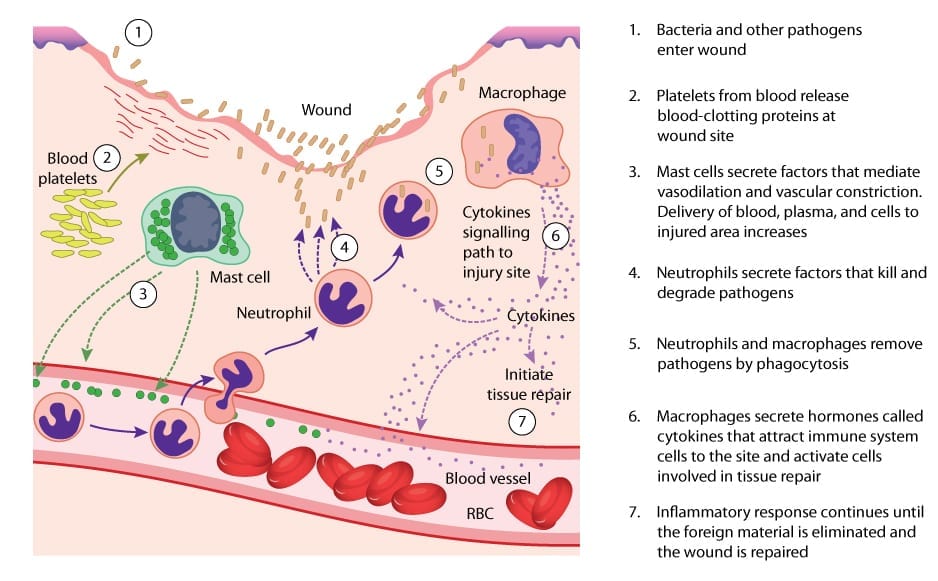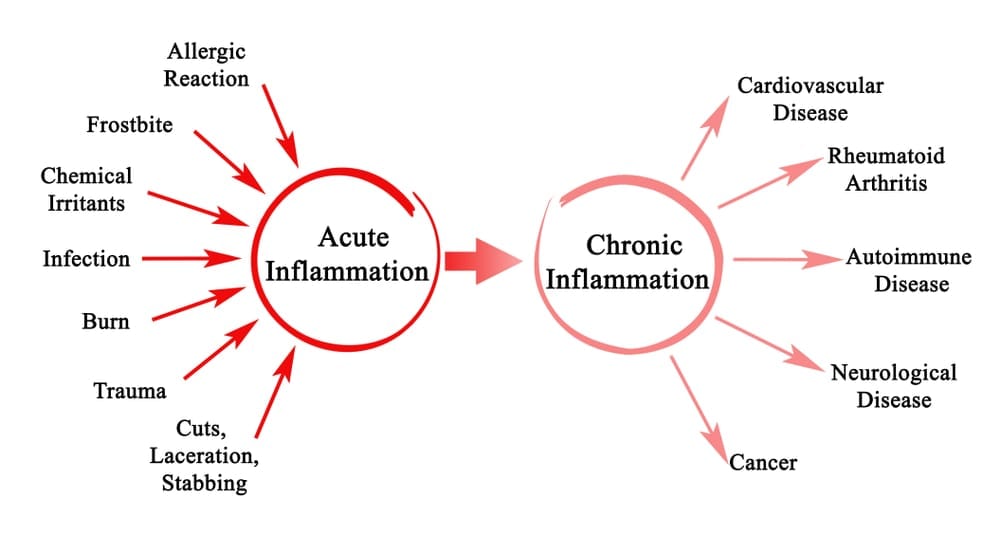
Research shows the ketogenic diet can reduce inflammation — a key factor involved in many diseases. The keto diet can boost antioxidant production, lower inflammation, and more [1] [2]
What is Inflammation?
In the body, inflammation is the immune system’s response to an irritant. A wound that turns red, swells up, and becomes painful could be a sign of inflammation. Certain chemicals are released with the body’s inflammatory response.
Inflammation might be caused by viruses, fungi, or bacteria, external injuries, or toxins, such as chemicals or radiation [3]. Inflammation might play a role in a surprising number of diseases, including cardiovascular disease.
What are Autoimmune and Inflammatory Diseases?
Inflammatory diseases involve inflammation that might be more systemic or localized. With autoimmune disease, the body’s immune system that protects from infection and disease attacks healthy cells in the body. Some researchers believe the immune system is attacking healthy cells by mistake.
Autoimmune disease can affect different parts of the body and the cause isn’t clear. Some people have more than one autoimmune disease and many of the symptoms of the more than 80 types of autoimmune disease are similar, often making it more difficult to pinpoint specific conditions. Rheumatoid arthritis and ankylosing spondylitis are examples of two arthritic and inflammatory autoimmune diseases.
Autoimmune and inflammatory diseases can be particularly painful, and the symptoms often worsen during flare-ups. Part of the reason these conditions can be so painful is due to the high levels of inflammation soaring throughout the body and affecting muscles, tendons, ligaments, and bones. The first symptoms of autoimmune disease are typically muscle aches, a low fever, and fatigue. Inflammation is a key indicator of autoimmune disease and many autoimmune diseases are diagnosed based on certain blood test results, such as inflammatory markers or genetics [4]
Examples of inflammation diseases includes the following:
- Allergies
- Asthma
- Arthritis
- Chron’s Disease
- Coeliac disease
- Gout
- Inflammatory Bowel Disease (IBD)
- Lupis
- Multiple sclerosis
- Myositis

What Does the Research Say About Keto and Inflammation?
With the wealth of propitious research on the ketogenic diet, it’s easy to acknowledge the potential for positively modifying chronic disease and enhancing general health and wellness [5]. Studies show the healthy fats and the lack of sugar on the ketogenic diet can reduce inflammatory markers. Keto is far superior for lowering inflammation when compared to a low-fat diet [6] [7].
Research underlines the impressive benefits of the ketogenic diet for the mitochondria, inflammatory dermatologic disease, and for autoimmune diseases, such as multiple sclerosis [8] [9].
Sugar and sugar-sweetened beverages have been shown to promote inflammation [10]. Since keto greatly decreases sugar consumption, this could also be another reason why the keto diet can be anti-inflammatory.
Some studies zone in on specific types or versions of ketogenic diets, such as a paleo-style ketogenic diet that excludes certain food groups, such as grains. Paleolithic ketogenic diet plans have shown promise for chronic diseases, type 1 diabetes, and more [11].
Many people experience more relief by taking the ketogenic diet a step further and modifying it to suit their individual needs. For example, someone struggling with digestive issues might want to try excluding specific food groups like dairy or grains from their diet at least for a few months. Check out our helpful article on how to go keto dairy-free!
So, let’s lower inflammation, boost antioxidants, and the rest…keto style!
Has Going Keto Helped Your Inflammation, Inflammatory Disease, and / or autoimmune disease(s)?
Comment below and share your health transformation story with us.
References
Ruskin, D. N., Kawamura, Jr., & Masino S. A. (2009). Reduced pain and inflammation in juvenile and adult rats fed a ketogenic diet. PLOS One, 4(12),
Dupuis, N., Curatolo, N., Benoist, J., & Auvin, S. (2015). Ketogenic diet exhibits anti-inflammatory properties. Epilepsia,
InformedHealth.org (2010). What is Inflammation?
U.S. National Library of Medicine. Autoimmune Diseases.
Gasior, M., Rogawski, M. A., & Hartman, A. L. (2006). Neuroprotective and disease-modifying effects of the ketogenic diet.Behavioural Pharmacology, 17(5-6), 431-439.
Forsythe, C. E., Phinney, S. D., Fernandez, M. L., Quann, E. E., Wood, R. J., Bibus, Doug. M., Kraemer, W. J., Feinman, R. D., & Volek, J. S. (2007). Comparison of low fat and low carbohydrate diets on circulating fatty acid composition and markers of inflammation. Lipids,
Masino, S. A., & Ruskin, D. N. (2013). Ketogenic diets and pain. Journal of Child Neurology, 28(8), 993-1001.
Fomin, D. A., Mcdaniel, B., & Crane, J. (2017). The promising potential role of ketones in inflammatory dermatologic disease: a new frontier in treatment research. Journal of Dermatological Treatment, 28(6),
Storoni, M., & Plant, G. T. (2015). The therapeutic potential of the ketogenic diet in treating progressive multiple sclerosis. Multiple Sclerosis International,
Aeberli, I., Gerber, P. A., Hochuli, M., Kohler, S., Haile, S. R., G, I., Berthold, H. K., Spinas, G. A., & Berneis, K. (2011). Low to moderate sugar-sweetened beverage consumption impairs glucose and lipid metabolism and promotes inflammation in healthy young men: a randomized controlled trial. The American Journal of Clinical Nutrition, 94(2), 479-485.
Clemens, Z., & Tóth, C. (2018). Paleolithic ketogenic diet (PKD) in chronic diseases: clinical and research data. Journal of Evolution and Health,









I began a Keto diet last summer. I lost weight, had more energy, felt pretty good in general. However, my knee puffed up twice its normal sized and has been swollen ever since. I lost heart and gave up on keto. A week ago, I went on a 12 day water fast. The inflamation went way down and I was motivated to re-try keto. Less then a week into it and my knee is puffing back up so I guess I need to tweek the keto diet. I hate the idea of restricting my eating more than I am already restrictedBUT, I hate the inflamation more.
I’m a 56-yr-old woman and followed the keto diet for 2 1/2 years, then started struggling with carb cravings a year ago. It was a shame because I felt so amazing for the first two years! Like I was twenty years younger, slim, active, positive! After a very stressful year (tough at work, had Covid in Dec, etc), I gave up on keto last Spring and just ate whatever I wanted. I also got the Covid vaccines last Spring. By mid summer I felt so awful (muscle fatigue, body aches, extreme joint pain, gained 20 lbs), that my doc did some testing. She was thinking I either had long Covid or a bad reaction to the vaccine. Results came back positive for three lupus markers (which runs in my family). The symptoms were so bad that I started eating just meat and eggs. Within 24 hours, 80% of my symptoms were gone! It’s been about 6 weeks now and I feel pretty good, have lost 15 pounds, and am gradually expanding my diet to other ketogenic things. In hindsight, I think I’ve been battling inflammation and autoimmune disorders most of my adult life.
I’m curious about the diagram in this post. It looks like acute inflammation leads to chronic inflammation, which leads to autoimmune disorders. My main trigger seems to be food allergies. Could this lead to all of my trouble?
I’m on an extreme keto diet- almost all I’ve eaten for the last week is eggs, sausage, and some coconut oil and brazil nuts. I’ve been on keto before, it’s the only diet aside from Atkins that’s ever let me lose weight, and it helps with my asthma too. But it’s hard because I can’t eat spinach or walnuts. I don’t dare eat most vegetables or fruit these days because so many of them make me sick. I can’t eat mushrooms either. So what I can safely eat is pretty limited. My entire family except for Mom- meaning Dad and all us kids- have food sensitivities. I have hypothyroidism- likely autoimmune. I have chronic anemia- which is also linked to immune issues in people with hypothyroidism. I also have asthma, IBS, pre-diabetes, PCOS, mental illness (guess who’s the only one with no autism or mental illnesses? Mom.), eczema, etc. Dad has eczema and diabetes too, and his mother had diabetes and hypothyroidism. I bet that if I can stay on a keto diet for years (aside from Thanksgiving and Christmas, because nothing’s keeping me away from all the awesome holiday food my Grandma and Mom make.) I’ll lose weight, but I wonder if I’ll ever be able to go off the keto diet and not immediately have asthma and all that crud again. Am I going to have to do this forever? If I ever manage to have kids, is there any chance they won’t inherit this?
Hi Kathleen–these are all great questions but probably best that you consult with your doctor so he/she can suggest the best path to take. Good luck to you!